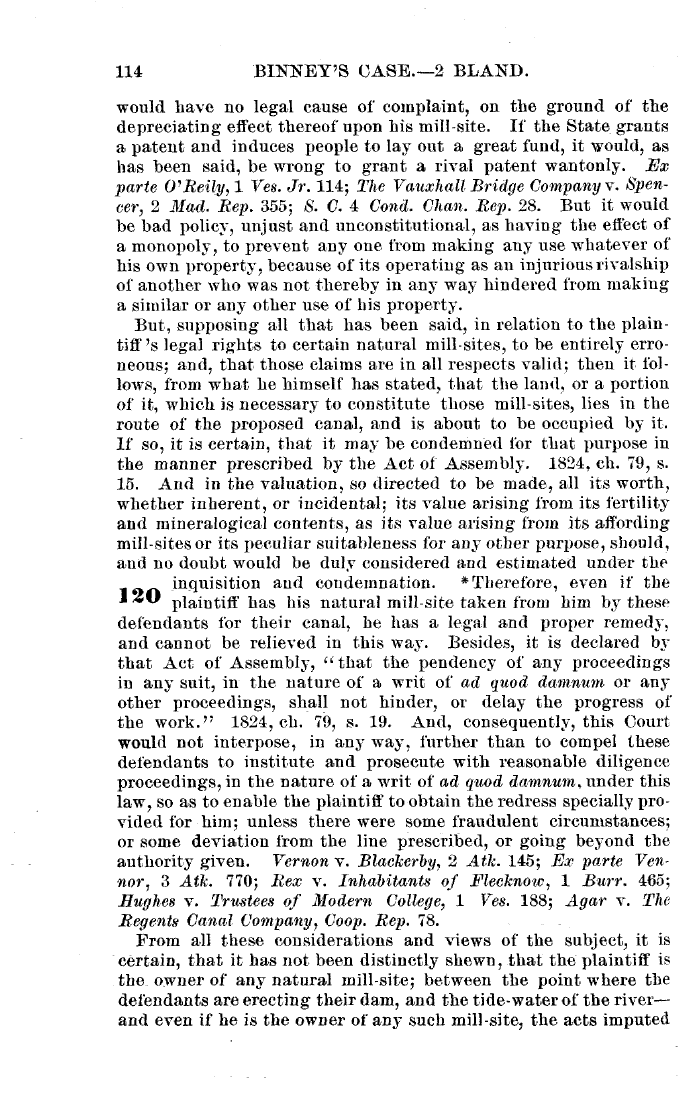|
114 BINNEY'S CASE.-2 BLAND.
would have no legal cause of complaint, on the ground of the
depreciating effect thereof upon his mill-site. If' the State grants
a patent and induces people to lay out a great fund, it would, as
has been said, be wrong to grant a rival patent wantonly. .Ex
pane 0'Reily,1 Ves. Jr. 114; The Vauxhall Bridge Company v. Spen-
cer, 2 Mad. Rep. 355; S. C. 4 Cond. Chan. Rep. 28. But it would
be bad policy, unjust and unconstitutional, as having the effect of
a monopoly, to prevent any one from making any use whatever of
his own property, because of its operating as an injurious rivalship
of another who was not thereby in any way hindered from making
a similar or any other use of his property.
But, supposing all that has been said, in relation to the plain-
tiff's legal rights to certain natural mill-sites, to be entirely erro-
neous; and, that those claims are in all respects valid; then it fol-
lows, from what he himself has stated, that the land, or a portion
of it, which is necessary to constitute those mill-sites, lies in the
route of the proposed canal, and is about to be occupied by it.
if so, it is certain, that it may be condemned for that purpose in
the manner prescribed by the Act of Assembly. 1824, ch. 79, s.
15. And in the valuation, so directed to be made, all its worth,
whether inherent, or incidental; its value arising from its fertility
and mineralogical contents, as its value arising from its affording
mill-sites or its peculiar suitableness for any other purpose, should,
an(] no doubt would be duly considered and estimated under the
inquisition and condemnation. *Therefore, even it' the
120 plaintiff has his natural mill-site taken from him by these
defendants for their canal, he has a legal and proper remedy,
and cannot be relieved in this way. Besides, it is declared by
that Act of Assembly, " that the pendency of any proceedings
in any suit, in the nature of a writ of ad quod, dam.nurn or any
other proceedings, shall not hinder, or delay the progress of
the work." 1824, ch. 79, s. 19. And, consequently, this Court
would not interpose, in any- way, further than to compel these
defendants to institute and prosecute with reasonable diligence
proceedings, in the nature of a writ of ad quod damnum, tinder this
law, so as to enable the plaintiff to obtain the redress specially pro-
vided for him; unless there were some fraudulent circumstances;
or some deviation from the line prescribed, or going beyond the
authority given. Vernon v. Blackerby, 2 Atk. 145; Ex pane Ven-
nor, 3 Atk. 774; Rex v. Inhabitants of Flecknow, 1 Burr. 465;
Hughes c. Trustees of Modern College, 1 Ves. 188; Agar v . The
Regents Canal Company, Coop. Rep. 78.
From all these considerations and views of the subject, it is
certain, that it has not been distinctly shewn, that the plaintiff is
the owner of any natural mill-site; between the point where the
defendants are erecting their dam, and the tide-water of the river-
and even if he is the owner of any such mill-site, the acts imputed
|

